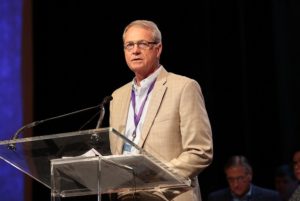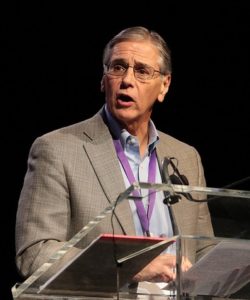As national media flocked to Dallas to watch the Southern Baptist Convention reckon with a generational shift in thinking about women, race and partisan politics, one light rail stop away a smaller and lesser-known group met under the radar to discuss division over homosexuality.
The 2018 Cooperative Baptist Fellowship General Assembly June 13-15 at the Hyatt Regency Dallas marked the first national gathering since CBF leaders in February dropped an official policy barring the employment of “a practicing homosexual” as staff or global missions field personnel.
An accompanying implementation plan stated that CBF will consider for leadership and missionary positions only those Christians “who practice a traditional Christian sexual ethic of celibacy in singleness or faithfulness in marriage between a woman and a man.”
Those criteria — based on prevailing practices in most CBF congregations and the impact an LGBTQ-affirming stance could have on relationships with international mission partners – prompted some more liberal congregations to reconsider their continued relationship with the 1,800-church body that split from the Southern Baptist Convention in the 1990s over issues including the ordination of women.
Others holding to the traditional view that the Bible does not condone same-sex relations wondered if by supporting CBF global missions they now tacitly promote sin. Two SBC-affiliated Baptist state conventions stopped collecting and forwarding church funds designated for Fellowship ministries in response to the change, while leaders of another determined “churches that contribute to a missions network that is approving of homosexual behavior” are no longer in friendly cooperation.

Past moderator Doug Dortch delivers report for CBF Governing Board. (CBF photo)
With dust still settling, the CBF Governing Board sought to move the conversation from the denomi-network’s headquarters in Decatur, Georgia, to churches that choose to remain in the Fellowship regardless of their views on a topic that is dividing a number of religious bodies around the world, including United Methodists and Presbyterians.
“The Governing Board is decidedly of the opinion that the time has come to localize this conversation as much as possible,” past moderator Doug Dortch said in a report during a business session of the General Assembly.
“At the end of the day, neither the Illumination Project committee nor the Governing Board ever intended to bring a resolution of the varying beliefs and practices regarding the matter of human sexuality which then might be imposed wittingly or unwittingly, purposely or unintentionally, on local churches and individuals, because after all the Governing Board is not a College of Cardinals,” said Dortch, senior minister of Mountain Brook Baptist Church in Birmingham, Alabama.
“The deciders on this matter and all matters are the people in our church pews,” Dortch said. “The people in our church pews are the ones who lead CBF in this particular matter as well as all other potentially divisive matters that we may be called upon to address. It does not go the other way around. We do not tell churches and individuals how they are to decide on anything.”
While widely criticized, CBF Executive Coordinator Suzii Paynter said the two-year “Illumination Project” study achieved its primary goal.
“We have successfully navigated the issue of human sexuality without being torn apart,” Paynter said in Q&A breakout session devoted to reaction to the new hiring policy and implementation plan.
Paynter said LGBQT persons “are valued members of CBF congregations,” and not just those churches that have adopted a welcoming-and-affirming stance.
“LGBTQ persons are in every kind of CBF church,” Paynter said.
Outgoing CBF moderator Shauw Chin Capps said the process reminded her to the story of Jesus’ miraculous multiplication of loaves and fish in John 6.
“I am more than aware that what I and my Governing Board colleagues have offered this last year was a limited, meager offering, given the massive challenge of holding our Fellowship together in all its diversity of beliefs on the topic of human sexuality,” Capps said. “I remember saying to myself, ‘If Richard Stearns, the CEO of World Vision, can’t do it, what makes me think we can?’”
In the end, she said, “I do believe we did the best we could” in seeking a way forward for CBF.

Gary Dollar (CBF photo)
The new moderator, Gary Dollar, said CBF diversity is something to be celebrated rather than tolerated.
“We are diverse in multiple ways,” said Dollar, a partner with EMD Consulting, a Missouri company that assists nonprofit groups in fundraising, leadership development and organizational strength. “This can be powerful as we seek to become all things to all people so that by all possible means we might win some.”
“There are people you can reach that I cannot,” said Dollar, former CEO of the United Way of Greater St. Louis. “There are probably people I can reach that you cannot.”
LGBTQ allies, meanwhile, indicated the discussion of LGBTQ inclusion is not going away at the national level.
Catherine Chapman, head of the Association of Welcoming and Affirming Baptists, sent Paynter an open letter on the eve of the General Assembly calling for “100 percent inclusion within the Cooperative Baptist Fellowship.”
“Exclusion is contrary to Christ’s actions,” Chapman said.
Greenwood Forest Baptist Church in Cary, North Carolina, requested a “public update” on discussions since the congregation called in March for the Fellowship “to rescind and reject in entirety” the implementation portion of the Illumination Project report.
About 140 people attended a breakfast meeting to launch a new “Affirming Network” to advocate for LGBTQ causes including “seeking an official CBF rejection of the homophobic implementation plan.”
“The Affirming Network is an official opportunity for acknowledgment of LGBTQ ministers, congregants and their allies within CBF are vital to the continued life of the larger denomination and its goals,” said Maurice “Bojangles” Blanchard, an openly gay Baptist minister and one of the network organizers. “Our voices matter. Our experiences matter. Some 140 of you have come from near and far to break bread for this truth, and we are so grateful to God for this historic and hopeful event.”
For veteran CBFers, crossing paths with Southern Baptist Convention messengers kindled memories of the 1985 SBC annual meeting in Dallas in the midst of a denominational upheaval remembered alternately as the “conservative resurgence” or “fundamentalist takeover” of the nation’s second-largest faith group behind Roman Catholics.
A record 45,519 messengers registered for the 1985 convention. By those standards, this year’s 9,637 registration seemed relatively small, but it was nearly twice the size of last year’s meeting in Phoenix.
Observers termed the 2018 SBC a watershed year, marked by a zero-tolerance stance on abuse of women in light of the #MeToo and #ChurchToo movements and open criticism of an invitation to Vice President Mike Pence, who used his SBC speech to tout accomplishments of President Donald Trump.
“It’s a joy to be with you all,” Pence said. “I know that with your support and prayers, with the strong support of leaders at every level of government, with President Donald Trump in the White House, and with God’s help, we will make America safe again. We will make America prosperous again. And to borrow a phrase, we will make America great again.”
Near the end of the June 12-13 SBC annual meeting at the Kay Bailey Hutchison Convention Center Dallas, a motion ruled out of order sought to “disassociate our convention with any political rhetoric, any call to make America great again, and any praise of a man other than Lord Jesus Christ made during Mike Pence’s speech.”
Previous stories:
Baptist women share struggles, triumphs in life and ministry at BNG dinner
Southern Baptists boot church for racial prejudice
Southern Baptists grapple with #MeToo complicity
As Southern Baptists grapple with #MeToo culpability, an abuse survivor seeks to pay her bills
